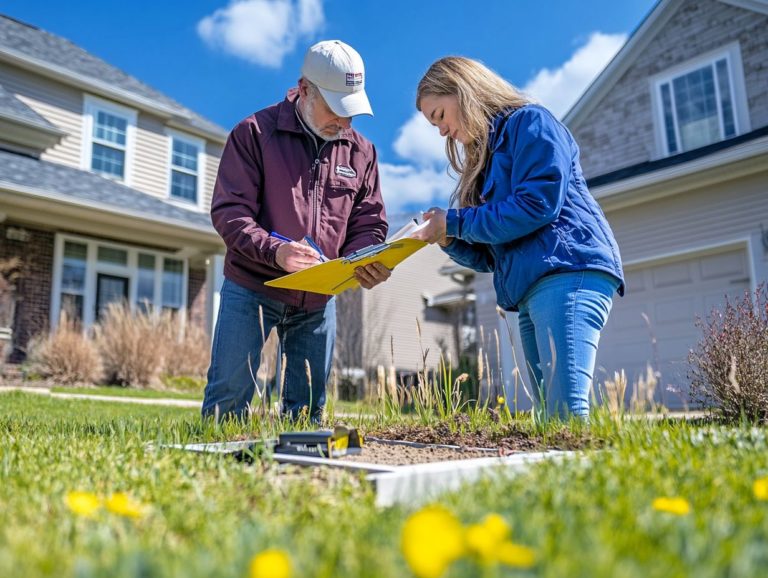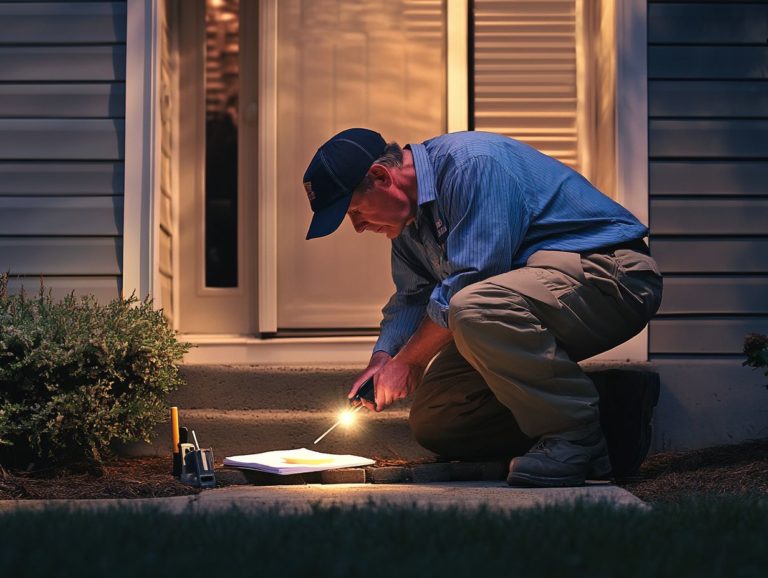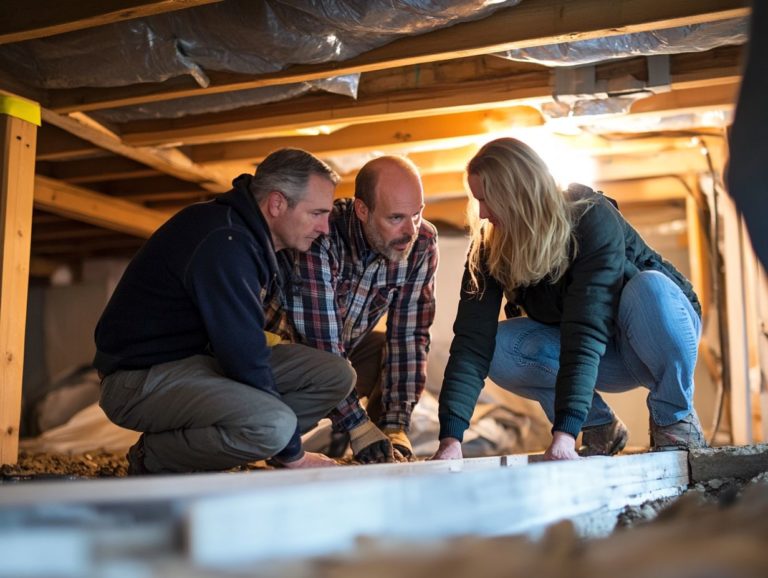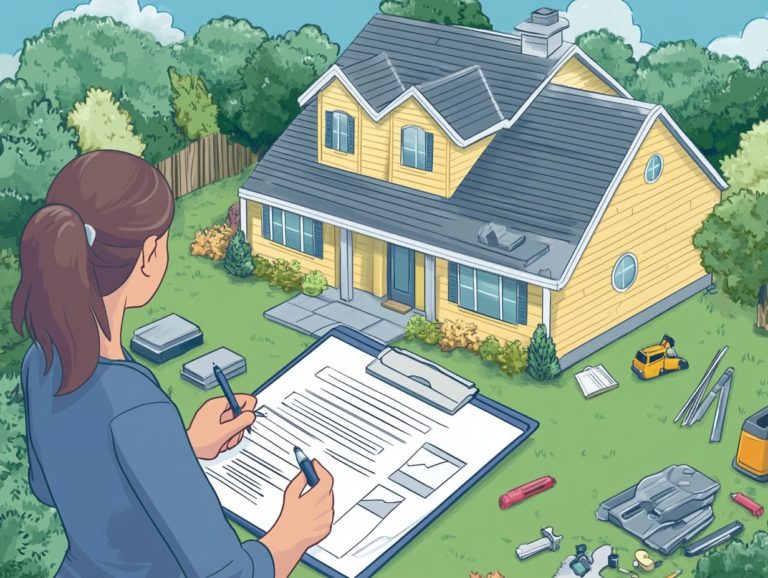The Value of Home Inspections for Home Sellers
Selling your home can be challenging, but a home inspection can make it easier! One pivotal step that often slips through the cracks is the home inspection.
Understanding the importance of home inspections enables you to navigate potential pitfalls while empowering you to enhance your property’s value. This article delves into the purpose and process of home inspections, outlining what you can expect and the advantages of having one completed before listing.
You ll discover practical tips for preparing your home and strategies for tackling any issues that may come up. By the end, you ll be well-equipped to elevate your selling experience and make informed decisions that benefit your bottom line.
Contents
- Key Takeaways:
- The Importance of Home Inspections for Home Sellers
- What to Expect During a Home Inspection
- Benefits of Getting a Home Inspection as a Seller
- How to Prepare for a Home Inspection
- What to Do After the Home Inspection
- Frequently Asked Questions
- What is the value of home inspections for home sellers?
- Do I really need to get a home inspection before selling my house?
- Who pays for the home inspection in a home sale?
- Can a home inspection affect the sale price of my home?
- What should I do if the home inspection reveals problems?
- Are there any benefits for home sellers who choose to get a home inspection?
Key Takeaways:
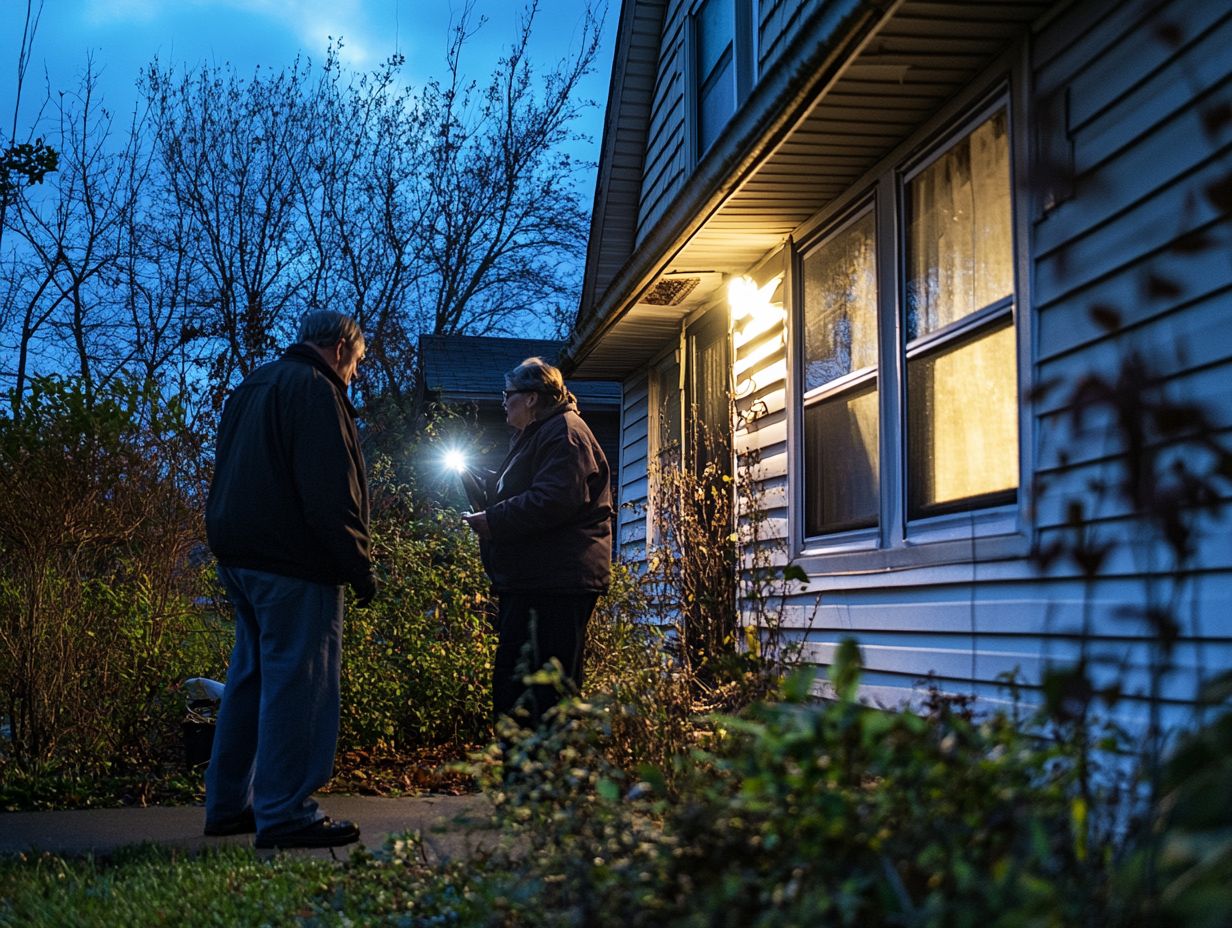
- As a home seller, getting a home inspection can help identify and address potential issues before listing your home on the market.
- A home inspection can enhance the market value of your home by showcasing its condition to potential buyers.
- It is important to prepare your home for inspection by fixing any minor issues and decluttering to make the process smoother.
The Importance of Home Inspections for Home Sellers
For home sellers, understanding the value of home inspections for real estate agents is an essential step in the selling process that can profoundly impact both the property’s market value and its attractiveness to potential buyers.
A comprehensive home inspection reveals critical insights into the property’s condition and gives you the power to tackle any hidden issues before putting your home on the market.
Hiring professional inspection services helps you uncover significant defects while acquiring valuable knowledge about necessary maintenance that can boost curb appeal and strengthen your position during negotiations with buyers.
Understanding the Purpose of a Home Inspection
The purpose of a home inspection extends far beyond simply gauging the property’s visual appeal; it uncovers critical insights related to the home s major systems and identifies potential safety hazards that could influence your investment decision.
By meticulously examining essential components like the HVAC system, plumbing, electrical wiring, and roof conditions, the inspection reveals issues that might easily slip under the radar during a casual walkthrough.
This detailed evaluation equips you with the necessary insights to negotiate repairs or even reconsider your purchase, fundamentally reshaping your approach to home buying.
For sellers, opting for a pre-inspection can be just as beneficial. It allows you to tackle issues proactively, making the selling process easier while minimizing unexpected hiccups that could jeopardize a sale. Understanding the need for home inspections is key to a smoother transaction.
In the end, a thorough home inspection becomes a critical tool for both buyers and sellers, fostering transparency and confidence in the real estate market.
What to Expect During a Home Inspection
As you prepare for a home inspection, it s essential to grasp the intricacies of the process and what lies ahead.
Typically, this involves a thorough visual examination of critical areas, including the roof, foundation, electrical systems, HVAC, and plumbing systems. Understanding these components will help you navigate the inspection with confidence and clarity.
Inspection Process and Common Areas Checked
The home inspection process requires a meticulous examination of several crucial areas, such as the roof condition, plumbing systems, and electrical panel, ensuring that all major components are operating at peak performance.
Inspectors typically begin with the roof, looking for any signs of wear or damage that might hint at potential leaks or future costs. Following that, they turn their attention to the plumbing, checking for leaks, assessing water pressure, and evaluating the condition of the piping to confirm that both water supply and drainage systems are functioning smoothly.
The electrical panel receives thorough scrutiny as well, with inspectors on the lookout for outdated wiring or safety hazards that could pose significant risks. They also assess the foundation and structural integrity, searching for any cracks or shifts that might lead to serious issues in the future.
Identifying these potential structural concerns is essential; it gives you the power to make informed decisions, negotiate necessary repairs, or adjust your offers as needed.
Don’t wait until you’re listing your home schedule a home inspection today to uncover any hidden issues!
Benefits of Getting a Home Inspection as a Seller

For sellers, securing a home inspection offers substantial advantages. By identifying and addressing potential issues prior to listing the property, you enhance the home’s value and streamline the sales process. Understanding the benefits of home inspections makes the process smoother and more efficient.
Identifying and Addressing Potential Issues
One primary benefit of a home inspection is your ability to identify and address potential issues, such as structural problems, water damage, and mold. Addressing these concerns before they become significant obstacles during a sale is crucial.
Beyond these issues, inspections often uncover concerns related to heating, ventilation, and air conditioning systems, including aging units that may need repairs or replacements.
Buyers typically appreciate being informed about maintenance needs upfront, as it gives them the power to plan for necessary upgrades or immediate fixes. This proactive approach facilitates smoother negotiations between buyers and sellers, while enhancing the overall condition of the property.
By addressing these issues directly, you can instill confidence in prospective buyers. This can potentially accelerate the sale process while maximizing your home’s market value.
Enhancing the Market Value of Your Home
A proactive home inspection can greatly enhance your home’s market value by addressing potential issues before you list it. This boosts buyer appeal and confidence, making it essential to understand the importance of home inspections.
By tackling any findings upfront, you showcase your commitment to quality, resonating well with potential buyers. This approach alleviates concerns about hidden problems and paves the way for smoother negotiations.
In a competitive real estate market, buyers are drawn to properties that exude transparency and reliability. Homes that have undergone a pre-inspection and boast a clean bill of health often attract multiple offers, ultimately driving up their selling price.
Investing your time in a thorough inspection is a smart move that pays off big in the long run!
How to Prepare for a Home Inspection
Preparing for a home inspection is essential and requires meticulous attention to detail. Engaging in thorough home maintenance and using a comprehensive inspection checklist will ensure your property is in prime condition ahead of the professional s visual evaluation.
This proactive approach enhances the home s appeal and instills confidence in the inspection process.
Tips for Preparing Your Home for Inspection
To guarantee a successful home inspection, implement essential preparation tips that highlight your property s strengths. Address safety hazards and potential mold concerns.
Start by conducting a comprehensive walkthrough of your home. Check for visible signs of water damage or leaks, particularly around windows and roofs. Replace any burnt-out light bulbs and ensure that all electrical outlets are functioning properly to avoid glaring red flags during the inspection.
Having operational smoke detectors and carbon monoxide detectors can significantly boost safety perceptions, making your home more appealing.
Clearing out clutter in attics, basements, and garages will provide inspectors with easy access to critical areas. This allows them to assess the functionality and condition of key systems without any hindrance.
What to Do After the Home Inspection

After a home inspection, it’s essential for you, as a seller, to meticulously review the inspection report. Taking strategic actions to address any issues revealed can greatly influence buyer negotiations and the entire sales process, especially when you have a clear understanding of the home inspection process.
Act now to resolve findings and build buyer trust!
Addressing Any Issues Found
Addressing issues highlighted in the inspection report is crucial. It empowers you to make informed decisions about necessary repairs and strengthens your position during negotiations with buyers.
By prioritizing transparency, you have the opportunity to build trust with potential buyers. This showcases your commitment to a smooth transaction process. Openly discussing major repairs or ongoing maintenance helps buyers feel more confident in their investment.
Focus first on fundamental concerns like safety hazards or plumbing issues, which relate to water pipes and fixtures. Proactively providing documentation for completed repairs can also reflect your diligence and attentiveness to property upkeep.
A clear strategy for addressing inspection findings can significantly enhance your property’s appeal. This makes it more marketable and reassures buyers in their decision-making process.
Negotiating with Buyers Based on Inspection Results
Negotiating with buyers based on inspection results is an important aspect of the home-selling process. It can significantly influence your final sale price and overall home value.
Real estate professionals recognize that how you present inspection findings can be important in these discussions. As a seller, emphasizing any major concerns uncovered during the inspection can strengthen your case when requesting price reductions or repairs.
For example, if serious issues like a leaky roof or outdated electrical systems arise, providing estimates for repair costs can support your position.
Remaining open to counteroffers is advantageous. This flexibility encourages constructive dialogue, ultimately paving the way for a win-win situation for both you and the buyer.
Frequently Asked Questions
What is the value of home inspections for home sellers?
The value of home inspections for home sellers lies in providing transparency and peace of mind to potential buyers. Understanding the home inspection process for sellers also helps identify any potential issues that could affect the sale price or timeline.
Do I really need to get a home inspection before selling my house?

While it is not legally required, it is highly recommended for home sellers to get a home inspection before listing their property. This helps prevent surprises or complications during the selling process.
Who pays for the home inspection in a home sale?
Typically, the home seller is responsible for covering the cost of the home inspection. This is considered a necessary expense to ensure the home is in good condition for potential buyers.
Can a home inspection affect the sale price of my home?
Yes, a home inspection can potentially affect the sale price of your home. If any major issues are found during the inspection, buyers may use this as leverage to negotiate a lower price. Addressing these issues before listing can help maintain its value.
What should I do if the home inspection reveals problems?
If the home inspection reveals problems, it is important to address them before listing the home. This could include making necessary repairs or being upfront about the issues with potential buyers.
Are there any benefits for home sellers who choose to get a home inspection?
Yes, there are several benefits for home sellers who choose to get a home inspection. These include increased trust and transparency with potential buyers, a smoother selling process, and potentially avoiding legal issues in the future. To learn more, check out the benefits of a home inspection.

